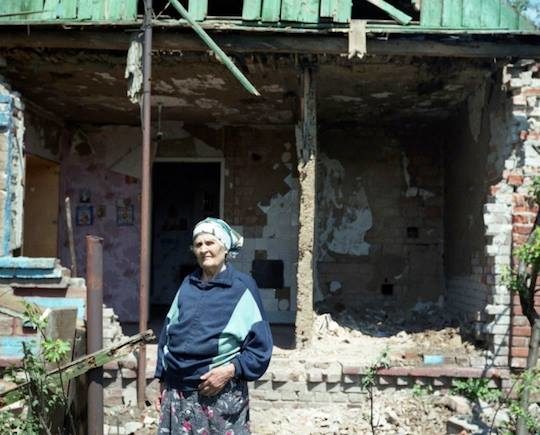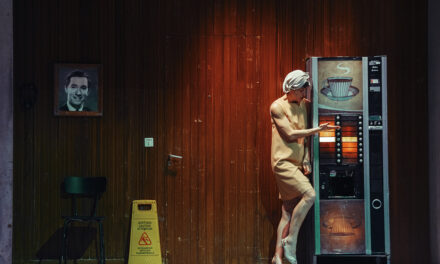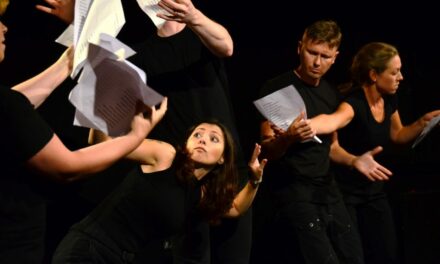During the post-Soviet period, Ukrainian dramaturgy lagged behind prose and poetry and was almost invisible both to theatres and publishers. Only in recent years a new generation of playwrights has become noticeable in the country’s general cultural landscape. Contemporary drama writers challenge the audience, both intellectually and emotionally, with harsh topics concerning political, social, and historical issues. Contemporary dramaturgy boosts the radical transformation of Ukrainian theatre through evoking new topics and altering the theatre language.
One of the main topics of contemporary Ukrainian drama is the country’s contested historical memory. There have been several attempts in dealing with the legacy of World War II, especially the debated narratives of the Red Army and of the UPA (Ukrainian Insurgent Army) in contemporary Ukraine. Among these attempts is Glory to the Heroes, a play written by Pavlo Arie. It shows the contested Ukrainian historical memory through the rivalry of two veterans–one of the Red Army and one of the UPA–who meet in a hospital ward while waiting for surgery. Each of them has his own interpretation of World War II based on his own military experience. The Red Army veteran perceives the UPA as Nazi collaborators; in turn, the UPA veteran accuses the Soviet soldier of supporting Stalin’s bloody dictatorship. Although Ukrainian society has a contested past, the author shows that the new generation has a different view of history and memory. Arie shows that the veterans’ children, who are trying to reconcile their grandparents, do not perceive the divided Ukrainian history as a reason for personal conflicts and hatred. Three state drama theatres in Lviv, Kyiv, and Ivano-Frankivsk have staged the play recently. Besides the play’s relative success, we can still observe ongoing difficulties for both artists and audiences in engaging in reflection and critical discussion about the conflicting versions of the past.
Furthermore, the drastic political, social, and cultural situation has influenced a high level of artistic engagement and reflection concerning current social and political challenges. In particular, it is worth to mention one short piece, To Kill a Gay, by the Kherson writer Yevhen Markovskyy, written in a shocking and insulting manner in 1999 and re-written in 2011. The main hero of the play is a nameless man obsessed with homophobic ideas that push him to kill all the people in the city he lives in. From the character’s point of view, the idea of eliminating all homosexuals–which turns into murdering all humans–was an act of “social responsibility,” a way of purifying society of “undesired groups.” Here is how the hero describes his activity: “This, which I am talking about, this is sort of… a duty or something. A useful thing for society.” Markovsky’s play is only a part of a general trend in Ukrainian dramaturgy that interprets current issues in Ukrainian society like homophobia, corruption, poverty, ecological disasters, and emigration.
Recent political events such as the Maidan protests and the war in Eastern Ukraine have also become an important topic in drama texts. One of the recently written texts is Pavel Yurov’s documentary play Novorossia: No One’s Land. In spring 2014, Yurov, a Kyiv-based theatre director, travelled to Sloviansk, a Ukrainian town in the Donbass, which at that time was occupied by Russian-backed rebels, to gather material for his new work, and he was held captive by rebels for two months. His play, which is based on a number of articles and interviews with leaders of the Novorossia movement, local people, media as well as on his direct experience of captivity, aims to uncover the main ideas and notions that underlie the Novorossian identity. This play was not only an attempt to use theatre and drama to tackle the current political situation in Ukraine, but also the artist’s self-reflection on his own identity as a person born in the Lugansk Region, which, from the rebels’ perspective, constitutes the core of Novorossia.
Thus, Ukrainian playwrights have been fostering a critical discussion about the present-day Ukrainian society; national and regional identities; history and memory. Also, their works stimulate altering of new theatres that share the idea of theatre as an institution of not only art production, but also of social change.
This post originally appeared on East European Performing Arts Platform on July 13, 2017 and has been reposted with permission.
This post was written by the author in their personal capacity.The opinions expressed in this article are the author’s own and do not reflect the view of The Theatre Times, their staff or collaborators.
This post was written by Oksana Dudko.
The views expressed here belong to the author and do not necessarily reflect our views and opinions.


















